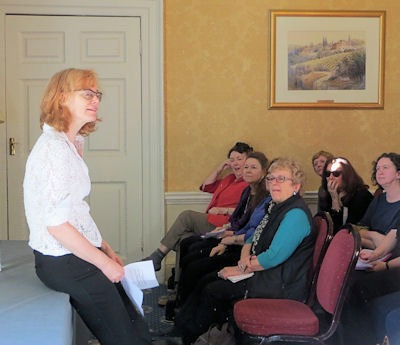
Talking to other authors, particularly the top-selling authors, is a great way to learn.
Not long ago, the fabulous Eloisa James spoke to a fascinated audience at the RNA meeting in London.
Eloisa writes historical novels that are regulars in the New York Times bestseller lists – and I was ready to learn whatever she had to teach me.
Her theme was the things she knows now that she wishes she had known back when… and this is what I took away.
Be strategic.
Read what’s selling now, look for reasons why it’s selling. Find the things about that book that work for you – the ‘reader pleasure’ moments. And read widely – not just your own genre. She suggested reading the best books a second time – being very analytical as you go. She also suggested finding something popular to attach your book to – if there’s a royal wedding in the air, write a royal wedding book. If fairy tales are selling – write a fairy tale. But take care not to leave it too late and get left behind.
Read your own work analytically too. It’s important to know what you do well and to work to your strengths.
Get into your Zen.
Things go wrong – even for someone who makes the Times Lists. Don’t let it get to you.
If it’s a problem with the book, listen to your editor and work to fix it. Ignore bad reviews. If your career has a hiccup – accept it, do what you can to fix it and move on. Don’t let those bad moments bring you down.
Sometimes you write rubbish.
We all do it and that’s fine. Let yourself do it, then accept it’s rubbish and fix it and write something better.
Be a businesswoman.
We write because we love writing – but it is a business. We need to understand the contracts we sign. We need to understand tax rules. If we need help understanding this stuff, get help from a lawyer or accountant – here in the UK, the Society of Authors is very helpful.
Be a manager.
Manage your career. If you have an agent and an editor – manager them too. This really means work with them. Tell them what you want to achieve , or what you want them to do for you.
Publishing a book is humiliating and risky.
When you send your book out there, you are exposing yourself to criticism. Genre fiction , and particularly romance, is sometimes viewed as ‘trash’. Or not even a ‘real book’. Don’t buy into that. Romantic fiction will not change the world, but you can deeply move an individual reader or maybe help them through a difficult time in their life. That’s a good thing – be proud of that.
Manage your grief
Books fail. Contracts fail. You will get bad reviews. You can learn from these – but first you have to manage the totally understandable emotional reaction. Do whatever you need to do to get past it. Eat chocolate. Take a long bath. Go to bed for a day. Then leave it behind and learn form it.
Never respond.
When you get bad reviews or are attacked on social media. Or misquoted. Don’t respond. That will only make it worse and could even expose the bad comment to an ever greater audience. It will take longer to get past it. Just ignore it and move on.
Never Make bad blood
There will be unpleasant moments with other authors, or with agents or publishers. Don’t let things get nasty. You never know when you will come back into contact with that person again – or in what roles.
Your friends aren’t always your friends
Don’t let your friends, however well meaning, take control of your writing. Don’t give your manuscript to too many people to read.. and don’t react too quickly to what they say. If you change your style or your voice or your story with every comment from every person – you will lose your own voice.
If you want a critique partner or beta reader, find someone you trust, whose opinion you value and work with them.
But at the same time – the friends you make among other authors will be among your very best friends. We should always be there for each other. Supporting each other. Helping each other write the best books we can.
There are too many reasons not to read – tv and computers and whatever – we all need to work together to make sure there are so many brilliant books out there that the readers keep coming back.
All very well said Eloisa – thank you. I’ll do my best.


Comments
30 responses to “Surviving as a writer”
Very useful tips. Thanks for sharing, Janet
My pleasure Zana.
Very usesfl post I sorry I missed her talk but your summary is very helpful, Janet.
You would have enjoyed her talk – she’s a very smart women indeed.
Thanks so much for this. I was really disappointed that I couldn’t go to the talk.
Glad to share Sally – maybe next time. J 🙂
Thanks, Janet. I appreciate your helpful overview of Eloisa’s talk. I was sorry to miss hearing her speak, but your summary is next best! Lots of useful tips, no matter where a writer is in their journey.
It was Jen – despite the fact the Eloisa is at the top of the list, as it were, there was lots of useful stuff there for everyone.
I’m sorry I missed the talk. Thank you for setting out the points so clearly as they’re all useful lessons.
Writing the blog was also my way remembering what she said, April. There’s a lot there worth remembering.
Thanks for this Janet, it is so helpful for those of us who cannot always manage to get to the talks.
Always happy to share, Sheila.
Many thanks for the summary, Janet. All very sound advice.
Hi Tania – glad to share.
Thank you, Janet, for writing up Eloise’s points so clearly – very helpful.
Hi Heather. She was a very clear speaker really made an impact with me.
Thanks for the great summary for those of us an ocean away!
You’re welcome Angela. If you ever get a chance to go to hear her speak over there – do go. You’ll enjoy it.
What wonderful sound advice! That just perked me up. Thanks so much for sharing, Eloisa and Janet. The bit about ‘Publishing a book …’ made me quietly whoop! Love it. 🙂 xx
I chuckled too – but it’s so right!
interesting to hear how one who has been in the business for a long time reacts to the negatives. Fab post – thanks Jan! x
Debs, Eloisa is obviously a very smart woman. Not only does she write good books – she’s a smart businesswoman as well.
Thanks Janet, fabulous summary of Eloisa’s talk, a really clear memory jog. I too have started reading one of her books and am enjoying it.
Which book Julie – I just read Kiss At Midnight – the Cinderella story. Loved it.
Concise and to the point. Wish I’d been there in person to hear her speak. Must have been very inspiring.
Hx
It was Henriette. I’ve been writing up a storm ever since. 🙂
Thanks for writing this up! I really wanted to go to the talk, but couldn’t, so I’m grateful for the notes!
No problems Rhoda – it was a great talk. Hope to see you next time. J X
Great tips from Eloisa, wished I’d been at this. Thanks for sharing them with us Janet ????
Nikki x
You’re welcome Nikki. J X